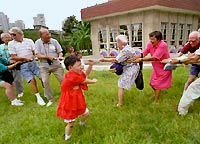 People who have lived in Beijing for quite a long time still have trouble believing their eyes at the sight of so many Korean restaurants and -- at the Wangjing Housing complex, the nation?s biggest residential area, located out of Beijing?s northeast Fourth Ring Road -- so many women strolling with their children talking to each other in Korean. When did the Wangjing housing complex become a ?Koreatown,? they wonder.
People who have lived in Beijing for quite a long time still have trouble believing their eyes at the sight of so many Korean restaurants and -- at the Wangjing Housing complex, the nation?s biggest residential area, located out of Beijing?s northeast Fourth Ring Road -- so many women strolling with their children talking to each other in Korean. When did the Wangjing housing complex become a ?Koreatown,? they wonder.
But Chinese residents of Wangjing housing complex themselves are not so surprised. Since 1998, Koreans began to pour into the housing complex, so much so that local residents now refer to it as ?Korea City.?
Although not as expansive as ?Chinatowns? in other countries, a number of foreign enclaves like the Koreatown area of the Chaoyang District have developed in Beijing. A ?Japan Village? has grown up around the New Otani Changfugong Hotel and Fortune Building where many Japanese are employed, and a ?German Center? around the Friendship Shopping City Beijing Lufthansa Center and Kempinski Hotel, the only German hotel in Beijing.
Koreans, however, did not settle in Wangjing because the housing complex is close to a Korean business center -- Koreans just really took a fancy to the place. A member of the staff of the Korean Embassy said that trade between Korea and China has developed so well in recent years that more and more Korean people are coming to China to take advantage of all kinds of business opportunities. One Korean woman, for instance, has become a personal trainer at a gymnasium in Beijing. Part of the appeal of Wangjing for Koreans is the rent: a two- or three-rooms apartment costs only 3,000 yuan (US$ 363) to 5,000 yuan (US$ 605), which is considered relatively cheap by Korean standards. Moreover, facilities like schools, restaurants and shops gradually are being established in the area, attracting still more Koreans from every corner of the city.
Wangjing also is home to companies specializing in apartment rentals and super markets run by Korean for Korean needs. One Korean woman has opened up a kindergarten in a two-room apartment where 10 Korean kids come to school every day. In Huanjiadi housing complex, adjacent to Wangjing, the Korean International School has been established by the Korean Embassy to provide still more conveniences for the Korean people who work and live in Wangjing.
At the end of the last year, Beijing?s German Center near the Friendship Shopping City Beijing Lufthansa Center, established in 1992 and located near to the northeastern section of the Third Ring Road, appeared in its embryonic form with the establishment of a school set up by the German embassy. Nearby is the Kempinski Hotel where the many German officials and entrepreneurs who come to Beijing each year like to hold receptions and commercial activities.
As for the Japanese, ten years ago, Japanese found Beijing a hardship post even though they could earn more money here than in Japan. Today, working in Beijing has become a cushy job thanks to the comforts of home now found in Beijing. Over 80 percent of the companies in the New Otani Changfugong Hotel and the Fortune Building, located in the center of Beijing, close to the eastern section of the Second Ring Road, are owned by Japanese. Most of the Japanese staff of companies based in the hotel also live in the hotel while those working in the Fortune Building live in the nearby Sanquan apartments or the Jingcheng Building. Japanese restaurants, big and small, have appeared in and around the Changfugong Hotel and the Fortune Building, both owned by Japanese. Karaoke, a Japanese favorite, also has made its appearance junction in a spot that attracts many Japanese visitors near the Yansha cloverleaf.
Chinese authorities are encouraged by the development of foreign settlements in Beijing which they believe will help assure that more and more foreigners will find Beijing an attractive home in which to both work and live.
(From Beijing Youth Daily and translated by Unisumoon for china.org.cn February 17, 2002)
